
The leader of the nearly 100-member Congressional Progressive Caucus made clear Tuesday that she’s not willing to accept cuts to Democrats’ $3.5 trillion budget reconciliation proposal, a sweeping climate and social spending package that conservative members of the party are currently attempting to scale back.
“There is no flexibility on the price tag, and it’s not because I care about what the top line is,” Rep. Pramila Jayapal (D-Wash.), the chair of the CPC, told the Washington Post. “It’s because I care about delivering on these benefits.”
Jayapal went on to warn that approving a watered-down version of the popular proposal—which includes Medicare expansion, paid family and medical leave, immigration reform, and major investments in green energy—could have disastrous electoral consequences for Democrats, who are clinging to vanishingly narrow majorities in the House and Senate ahead of the 2022 midterms.
According to a recent USA Today/Suffolk University survey, 52% of U.S. voters overall and 90% of Democrats support the $3.5 trillion package, which lawmakers are racing to complete by next month as deadly extreme weather across the U.S. lays bare the need for ambitious climate action.
“If we don’t deliver,” Jayapal said, “then I think all of the people who came out and voted for Democrats to take control of the House, the Senate, and the White House are going to come out and say, ‘that’s it.'”
Progressives in Congress believe they have the leverage to ensure that their major priorities are not stripped from the final reconciliation package to appease conservative Democrats, who are griping about the bill’s $3.5 trillion price tag without offering an alternative or specifically detailing which provisions they would like to cut.
For weeks, members of the CPC have promised to vote against a $550 billion bipartisan infrastructure bill backed by conservative Democrats unless a reconciliation package containing progressive priorities is approved at the same time—a position that Rep. Ilhan Omar (D-Minn.) reiterated Tuesday.
“The commitment on this strategy to move both of these pieces simultaneously still remains,” Omar, the CPC whip, told Roll Call.
Democratic committee leaders currently are rushing to finalize the details of the far-reaching reconciliation package before September 27, the date on which House Speaker Nancy Pelosi (D-Calif.) agreed to bring the bipartisan infrastructure bill up for a floor vote.
Asked about Sen. Joe Manchin’s (D-W.Va.) call last week for a “strategic pause” on the reconciliation package, Pelosi said Tuesday, “Obviously, I don’t agree.”
“The number is the number: $3.5 [trillion],” Pelosi added. “We’re going to pay for as much of it as possible. It’ll have far less impact on the national debt than Republicans’ 2017 tax scam.”
A large majority of that tax giveaway went to the richest 1%, noted Pelosi, and “it added $2 trillion to the national debt.”
Intraparty haggling over the final price tag of the reconciliation package comes as powerful corporations from a variety of industries—such as pharmaceuticals to fossil fuels—are mobilizing their vast resources in an effort to defeat the proposal, which is expected to include tax hikes on big businesses and wealthy individuals.
“These guys don’t lose,” Sanders (I-Vt.), the chair of the Senate Budget Committee and leading architect of the $3.5 trillion measure, told the Post earlier this summer when asked about the corporate lobbying blitz. “They’re going to lose this round.”
During five Labor Day town halls in his home state of Vermont on Monday, Sanders touted the reconciliation package as a necessity for “working families all over this country and to those of us who believe we have to act boldly on climate change.”
“We’ve got California on fire,” said the Vermont senator. “In Vermont, 3,000 miles away from Oregon, we’re breathing the air, the smoke from those fires. Unbelievable.”
Speaking to 350.org co-founder Bill McKibben at an event in Middlebury, Sanders stressed that the reconciliation package is “immensely popular, especially among working people,” and said it’s no surprise that corporations are aiming to tank the bill.
“The big-money interests are going to be hit on this bill,” Sanders continued. “They’re going to be asked to pay more in taxes. We’re going to move away from fossil fuel. We’re going to take on the pharmaceutical industry, the healthcare industry. Of course they are going to do everything they can to defeat it.”
‘No Flexibility on the Price Tag,’ Jayapal Says of $3.5 Trillion Bill
Source: Articles Viral Post
0 Comments